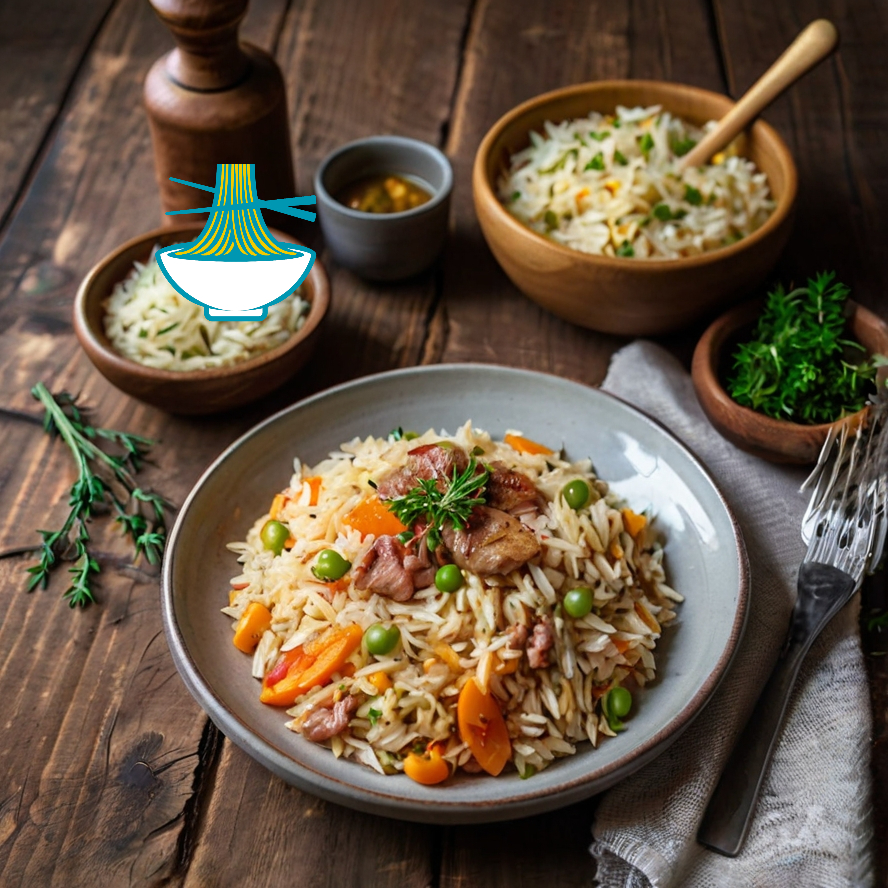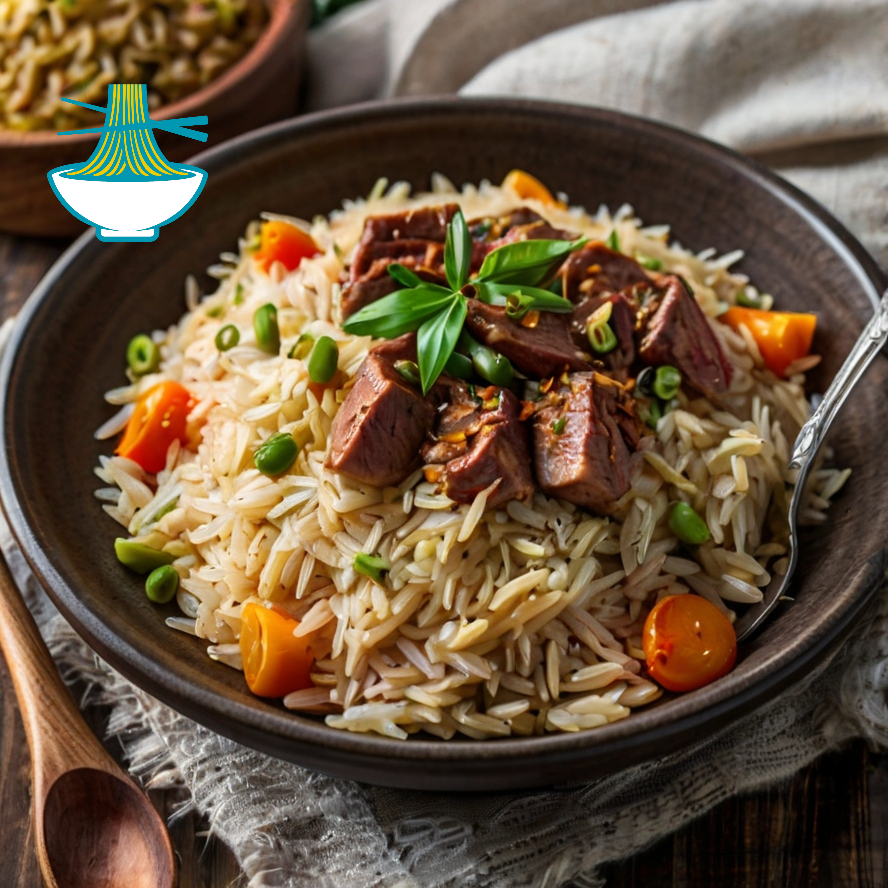Turkish Pilav is a traditional dish featuring buttered rice cooked with orzo, vegetables, and often meat or chicken. This flavorful dish combines aromatic spices with tender ingredients, creating a hearty and satisfying meal.
Pilav, or pilaf, has a rich history dating back centuries, with variations found across the Middle East, Central Asia, and South Asia. In Turkey, pilav is a staple dish deeply rooted in Ottoman cuisine. It evolved over time, influenced by various cultures and culinary traditions, becoming a beloved part of Turkish cuisine known for its versatility and delicious flavors. Today, Turkish Pilav remains a cherished dish enjoyed in households and restaurants across the country and beyond.
Ingredients :
- 1 cup long-grain rice
- 1/2 cup orzo pasta
- 2 tablespoons butter
- 1 small onion, finely chopped
- 1 carrot, diced
- 1 small tomato, diced
- 2 cups chicken or vegetable broth
- Salt and pepper to taste
- Optional: chopped parsley for garnish
Method:
1. Rinse the rice under cold water until the water runs clear. Drain well.
2. In a large skillet or pot, melt the butter over medium heat. Add the chopped onion and sauté until translucent.
3. Add the orzo pasta to the skillet and cook until golden brown, stirring frequently to prevent burning.
4. Stir in the diced carrot and tomato, and cook for another 2-3 minutes.
5. Add the rinsed rice to the skillet and stir to combine with the other ingredients.
6. Pour in the chicken or vegetable broth and season with salt and pepper to taste. Bring to a boil.
7. Once boiling, reduce the heat to low, cover, and simmer for about 15-20 minutes, or until the rice is tender and the liquid is absorbed.
8. Remove from heat and let the pilav sit, covered, for an additional 5 minutes.
9. Fluff the pilav with a fork, garnish with chopped parsley if desired, and serve hot.
Enjoy your delicious Turkish-style pilav!
Nutrition Value:
1. 1 cup long-grain rice
- Calories: ~205 kcal
- Carbohydrates: ~45g
- Protein: ~4g
- Fat: ~0.5g
- Sodium: ~1mg
- Cholesterol: 0mg
- Vitamins: Contains small amounts of vitamin B6, thiamin, and niacin.
- Minerals: Provides small amounts of magnesium, phosphorus, and zinc.
- Nutritional benefits: Rice is a good source of energy due to its high carbohydrate content. It also provides some essential vitamins and minerals, although the amounts may vary depending on the type of rice.
2. 1/2 cup orzo pasta
- Calories: ~200 kcal
- Carbohydrates: ~41g
- Protein: ~7g
- Fat: ~1g
- Sodium: ~1mg
- Cholesterol: 0mg
- Vitamins: Contains small amounts of vitamin B6 and niacin.
- Minerals: Provides small amounts of iron and magnesium.
- Nutritional benefits: Orzo pasta contributes carbohydrates and protein to the dish. It also contains some essential vitamins and minerals, although in smaller quantities compared to other ingredients.
3. 2 tablespoons butter
- Calories: ~204 kcal
- Carbohydrates: ~0g
- Protein: ~0.2g
- Fat: ~23g
- Sodium: ~152mg
- Cholesterol: ~61mg
- Vitamins: Contains small amounts of vitamin A.
- Minerals: Provides small amounts of calcium.
- Nutritional benefits: Butter adds richness and flavor to the dish but is high in saturated fat and calories. It also contains some vitamin A.
4. 1 small onion, finely chopped
- Calories: ~20 kcal
- Carbohydrates: ~5g
- Protein: ~0.5g
- Fat: ~0g
- Sodium: ~2mg
- Cholesterol: 0mg
- Vitamins: Contains vitamin C, vitamin B6, and folate.
- Minerals: Provides small amounts of potassium and manganese.
- Nutritional benefits: Onions add flavor and aroma to the dish and are low in calories. They also contain vitamins and minerals, especially vitamin C.
5. 1 carrot, diced
- Calories: ~25 kcal
- Carbohydrates: ~6g
- Protein: ~0.5g
- Fat: ~0g
- Sodium: ~42mg
- Cholesterol: 0mg
- Vitamins: High in vitamin A and a good source of vitamin K1 and biotin.
- Minerals: Provides potassium and small amounts of vitamin C and vitamin B6.
- Nutritional benefits: Carrots are rich in beta-carotene, which is converted into vitamin A in the body. They also provide vitamins and minerals, making them a nutritious addition to the dish.
6. 1 small tomato, diced
- Calories: ~15 kcal
- Carbohydrates: ~3g
- Protein: ~1g
- Fat: ~0g
- Sodium: ~3mg
- Cholesterol: 0mg
- Vitamins: High in vitamin C and a good source of vitamin K1 and potassium.
- Minerals: Provides small amounts of vitamin A and folate.
- Nutritional benefits: Tomatoes add sweetness and acidity to the dish while providing vitamins and minerals, especially vitamin C.
7. 2 cups chicken or vegetable broth
- Nutritional values vary depending on whether it's chicken or vegetable broth, and whether it's homemade or store-bought. Generally:
- Calories: ~10-20 kcal
- Carbohydrates: ~1-2g
- Protein: ~1-2g
- Fat: ~0-1g
- Sodium: ~400-800mg
- Cholesterol: 0-10mg
- Vitamins: May contain small amounts of vitamins depending on the ingredients used.
- Minerals: May contain small amounts of minerals depending on the ingredients used.
- Nutritional benefits: Broth adds flavor and moisture to the dish. It may also provide some vitamins and minerals depending on the ingredients used to make it.
8. Salt and pepper to taste
- Calories: 0 kcal
- Carbohydrates: 0g
- Protein: 0g
- Fat: 0g
- Sodium: Varies depending on the amount used.
- Cholesterol: 0mg
- Vitamins: 0
- Minerals: 0
- Nutritional benefits: Salt and pepper are used to enhance the flavor of the dish. While they do not provide significant nutritional value on their own, they can make the dish more enjoyable.
9. Optional: chopped parsley for garnish
- Calories: Negligible
- Carbohydrates: Negligible
- Protein: Negligible
- Fat: Negligible
- Sodium: Negligible
- Cholesterol: 0mg
- Vitamins: Parsley is high in vitamin K and vitamin C and contains small amounts of vitamin A and folate.
- Minerals: Provides potassium and small amounts of calcium and magnesium.
- Nutritional benefits: Parsley adds freshness and color to the dish and provides some vitamins and minerals, especially vitamin K and vitamin C.
These nutritional values are approximate and may vary depending on factors such as portion size and specific ingredients used.


Comments